Master-classes of the fifth working day of the exhibition
The public interest to the International Exhibition of Calligraphy has not languished even at the fifth working day of the tremendous event. A greater number of visitors is attending the halls of the Russian Academy of Arts; people keep coming to see the true treasures of various calligraphic schools and trends.
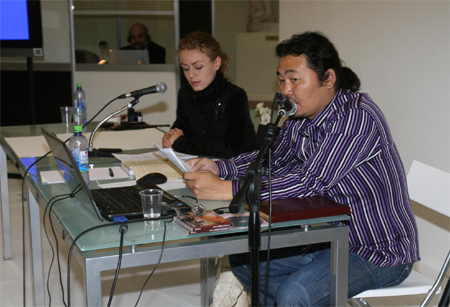 Master-class by Ganzorig Alyeksandr
Master-class by Ganzorig AlyeksandrGanzorig Alyeksandr, a designer from Mongolia, ran the first master-class of the day called “Calligraphy as a Classic Aspiration”.
He sees calligraphy in his own original way,
“There is no separate notion of ‘the beauty of calligraphy’. It cannot be measured or judged. Man can only feel it opening his soul for the Universe, crushing all taboo. This is a most self-manifesting image of an idea; we cannot see it, we cannot take in our hands. Yet, it does exist, or maybe not. The ability to feel another universe full of beauty and light gives Man a second birth in a different, better world.”
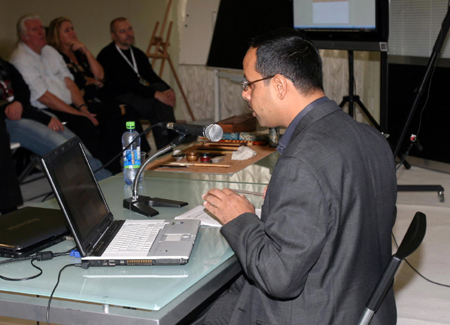 Master-class by Nassar Mansour
Master-class by Nassar MansourThe second master-class was headed by Nassar Mansour, a calligrapher from Jordan, Doctor of Arts, majoring in Arabic Calligraphy, professor of the Art of Arabic Calligraphy at Al-Balqa Applied University. His master-class entitled “Creation of a Writing Pen for Arab Calligraphy” was devoted to the nuances and hardships a writer usually experiences when choosing a proper pen.
“Creating a perfect writing pen is a true art. Once this skill used to be treated the secret knowledge of the art,” Mr. Mansour explained, unveiling a bit of one of the mysteries of this ancient art.
The third master-class was covering the issues of aesthetic wealth and exuberance of the Indian art of calligraphy, hosted by Achyut Palav, a famous calligraphy writer, designer and freelancer of the Institute of Applied (Commercial) Art.
Achyut Palav, a master of Indian calligraphy, was happy to share his opinion,
“India is my native land. This country can be rightfully proud of the most beautiful and magnificent of writing styles, the most outstanding people, the most splendid nature, the most breathtaking culture and the most formidable religious tolerance. India has become my inexhaustible source of inspiration”
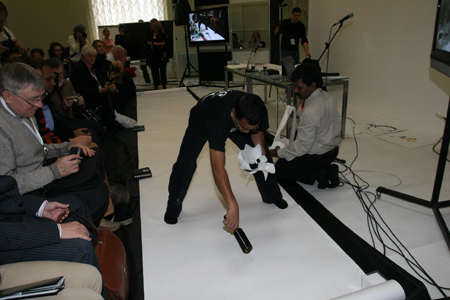 Creating a masterpiece - the beginning...
Creating a masterpiece - the beginning...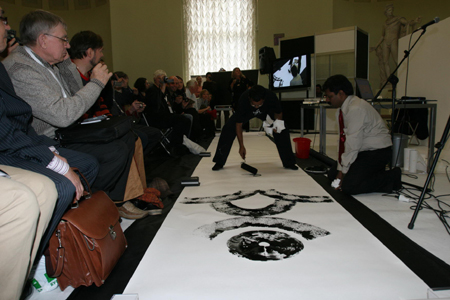 ...and fin
...and finThe next master-class was devoted to the Art of Arabic Calligraphy. Its author – Nazip Faizrahmanovich Ismagilov — is member of the Tatarstan Union of Artists, member of the Chamber of Arts and Crafts of the Republic of Tatarstan, a recognized scientist and textual critic.
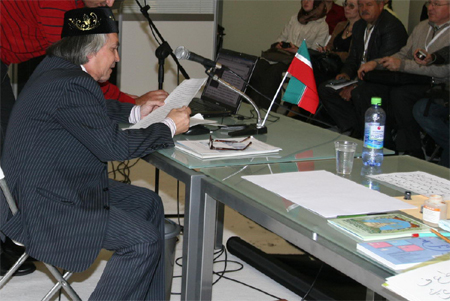 Master-class by Nazip Ismagilov
Master-class by Nazip IsmagilovMr. Ismagilov demonstrated unique samples of Arab calligraphy. In particular, he distinguished the two writing styles – Nasḫ and Ṯuluṯ – that are written with the help of a canvas pen and ink.
The second part of his master-class was entitled “The Tugra Genre in Tatar Calligraphy. A Brief History of the Art of Calligraphy of the Central Volga Region Tatars in the 10th - early 21st centuries.” Nazip Ismagilov narrated about the calligraphic practices and experiences that had deeply penetrated into the daily, religious and cultural lives of the Tatars. “Throughout these long centuries, these people tended to communicate their deepest thoughts, feelings and sacred knowledge through calligraphy”, he said.
Another master-class was presented by Chen Forng Shean, a calligraphy writer, sculptor, micro miniature artist from Taiwan. His sculptures deserve special attention, as many of them can be seen only through a powerful microscope. Mr. Chen is can easily engrave a poem on a dental floss. He can make a portrait on a shell of a watermelon seed or on wings of a fly, a sesame seed or a grain. The master-class was called “Writing Words on a Wing of a Fly. Chinese Characters on Paper”. The master was happy to share his sophisticated knowledge and unrivalled experience with people who had come to his class.
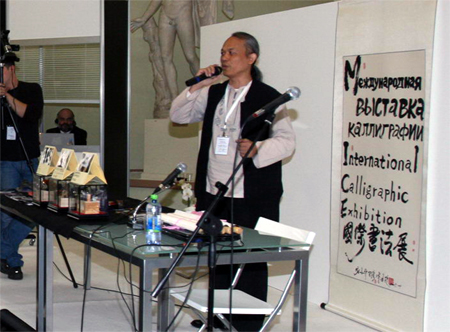 Master-class by Chen Forng Shean
Master-class by Chen Forng SheanThe last event today was a master-class by Chen Wenfu, continuator of a great dynasty of Chinese calligraphers, member of the Chinese Scientific Union of Antithetical Couplets.
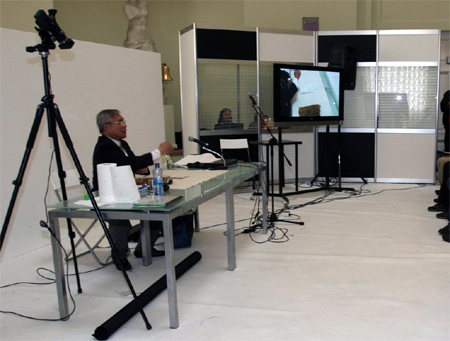 Master-class by Chen Wen-Fu
Master-class by Chen Wen-FuAll participants were safely sailed to the world of Chinese calligraphy. Still, it is impossible to explore the magnitude and beauty of the art having attended just one master-class. It usually takes a great amount of time and effort, as this art features all sorts of trends and nuances. Mr. Wen-Fu’s lecture is a perfect springboard for those willing to examine this art deeper.
It is worth mentioning that profound and recognized calligraphy writers of all schools and genres did not miss the opportunity to explore the practices and calligraphic methods of their colleagues. It was a solid ground for them to get new knowledge and skills as well as to improve their artistry.
Once again, we would like to highlight the fact that the project managed to become a truly global event pulling together Masters and Gurus who brought their unrivalled experience and knowledge from all over the world.
When there are no words left, the meaning is still preserved.



